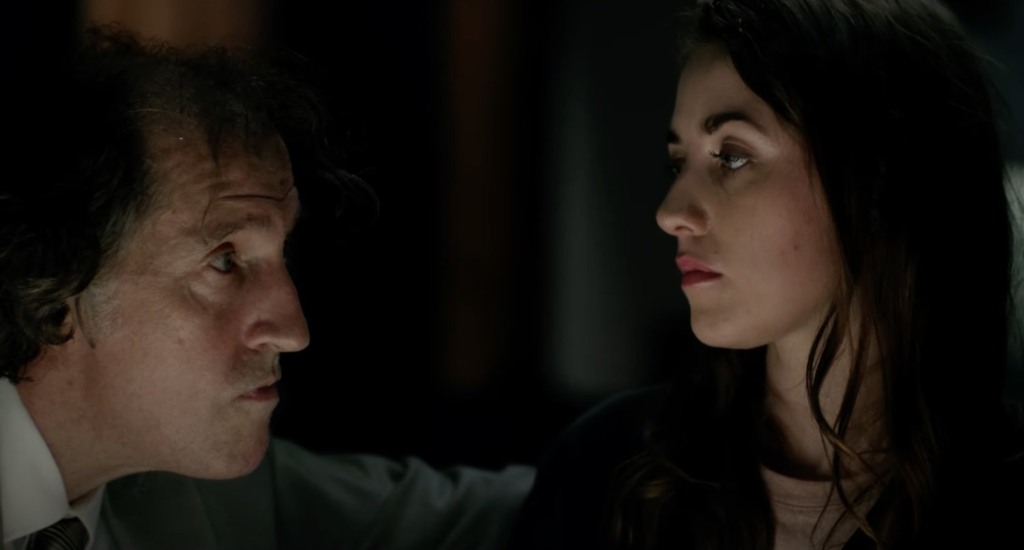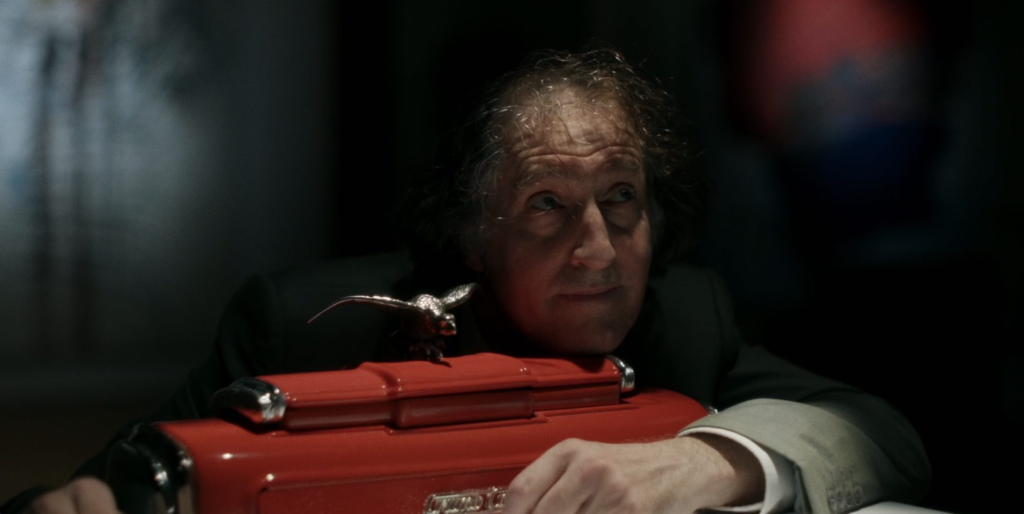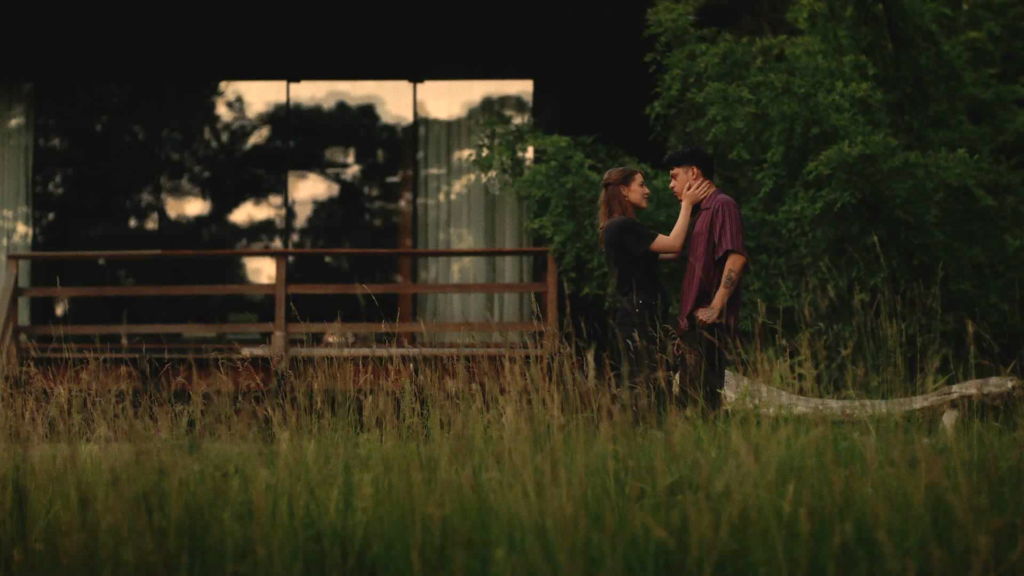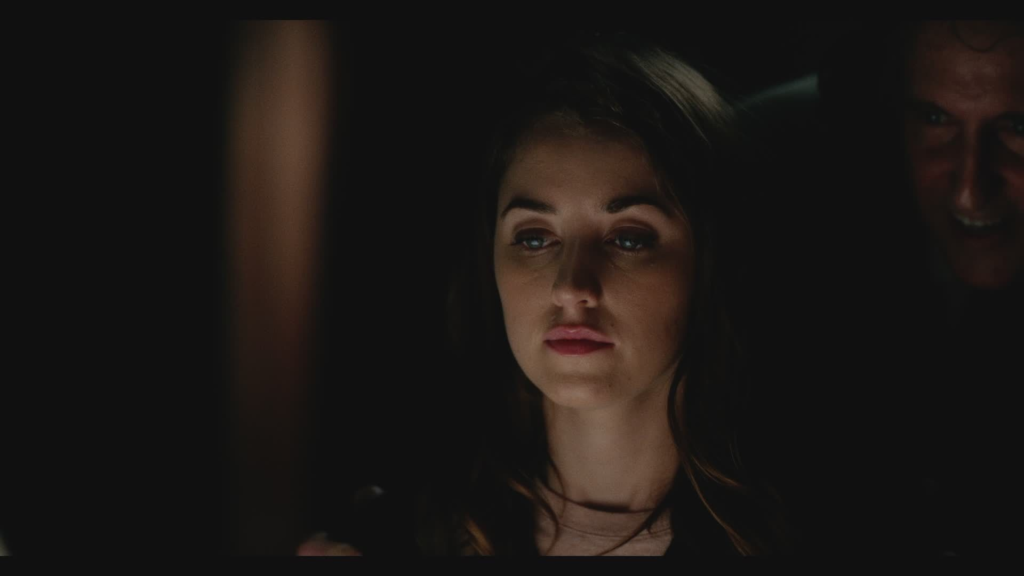Director: Chris Skotchdopole
Writers: Chris Skotchdopole, Larry Fessenden, Rigo Garay
Stars: Rigo Garay, Ella Rae Peck, Lorraine Farris, and John Speredakos
Synopsis: A newlywed couple is held captive in a remote lake house by a maniacally optimistic inventor and his sour wife who are desperate to finance his dream project with a half-baked blackmail plot.
Shane Castillo (Rigo Garay) and Leah (Ella Rae Peck) are posing for their wedding photographs. The photographer is asking them questions to get them into the mood for romantic shots. “How did you meet?” “What do you do?” Leah says proudly of Shane that he’s an author. She’s a publisher. “She works for me,” he jokes. “What do you write?” Nothing has been published yet, but Shane has written a “father and son” story. “It’s a bit more than that,” Leah exclaims and begins to tell the photographer about an author who wrote a bestseller called ‘Undocumented.’ She keeps talking to the photographer about literature and an upcoming article in the American Literature Critique. Shane’s eyes wander away from his bride to the bar. He’s looking for an escape route. One that becomes more pressing for him when his mother-in-law steps in asking for some “respectable” photographs of the couple (read more WASP friendly).

Whatever happened overnight at the Crystal Views hotel and wedding venue, one thing is certain – it didn’t involve a romantic night for the couple. Shane wakes up still in his wedding suit and immensely hung over. Leah is trying to just get them out of there and on their way to their actual honeymoon in a remote upstate cabin. Something which is delayed by the arrival of John Spinelli (John Speredakos), one of the cater waiters from the function room knocking on the window of Shane’s 1978 Cutlass. John’s apologizing for losing the couple’s cake topper and handing them champagne. He’s also making distinctly racist and sexist comments which Shane politely takes in while Leah, who was cornered by him before, cuts off as quickly as she can. It’s the kind of interaction no one particularly wants – not just because it comes from a middle-aged waiter sweating a certain desperate discontent, but more because extricating oneself from the situation requires polite dismissal at best, and rudeness being more effective.
On the road to the cabin, Shane and Leah go through what seems to be how their five-year-relationship has settled into. They love each other but there is a certain level of resentment rearing its head. “I can’t believe my mother talked me into the wedding!” Leah sighs after dealing with her not so savory relations. “We should have eloped,” Shane replies. Generally, that would be a couple on the same page, but something is off between them. They want to be married but they don’t want it that way. Leah capitulating to her family’s wishes annoys Shane. Shane not acknowledging the effort put in by her family annoys Leah. A deeper level of discontent surfaces when Shane’s father calls him, and Leah flashes a look of disdain at the number.
Shane’s father, an inveterate alcoholic, is the subject of his soon to be published book. Everything that Shane is now is based on his decision to turn his past into literary fodder for people he believes want stories from ‘street level’ without ever having to interact with ‘the street.’ His father wasn’t invited to the wedding, but his life is the meal ticket making his name. The cabin they are headed to belongs to Leah’s boss. Shane’s shiny new life with Leah comes with him exploiting and negating his Latino identity. Any feelings of guilt he has about that he’s projecting on to Leah. He’s also projecting his own anxiety about being only interesting because he has, or had, a gangsta swagger.
While Leah is trying to support Shane and is legitimately excited about the work he has done, he is becoming less sure that it belongs to him. When Leah says that it is something they have worked on together (which as his publishing agent is true) he snaps back that she doesn’t own any of the story. The book is the symbolic object which is dividing them more than it is bringing them together.

Leah and Shane get precious little time to tear strips off each other as soon they get an unexpected visit from John Spinelli who has driven hours to deliver their cake topper. Leah rightly wants to know how he knew where they were. He was added to the family Facebook group. He comes with his exhausted wife, Rose (Lorraine Farris) and an offer for the ‘rich people’ to help an entrepreneur out. Leah simply wants John and Rose to leave and is confused as to why Shane is being welcoming with the couple. Shane has his reasons – reasons which reveal him to be far less upstanding than he would like to believe.
Chris Skotchdopole switches from believable relationship drama into a dark hurdy-gurdy of black comedy theatrics which gets more desperate as each moment passes. The uninvited guests ensure they get their foot in the door and once there, they’re not going to leave without something. Why is John Spinelli there? Because he has an investment opportunity and a product pitch he’s going to deliver whether anyone likes it or not (and it’s clear even Rose doesn’t like it). Ladies and Gentlemen – please be seated while Spinelli Enterprises presents the Crumb Catcher.
The Crumb Catcher is an object of no conceivable worth to anyone except John Spinelli. What is it? In effect it doesn’t matter what it is because it is an auratic gesture to a time which never really existed. The Crumb Catcher is a lovingly designed mid-century modern table broom. Tired of waiters interrupting your romantic dinner by cleaning crumbs off your table? The solution is here! You can clean the crumbs off yourself and not have to interact with the lowly servers. It’s about to revolutionize fine dining and Leah and Shane have a chance to be in on the ground floor with an investment of 25 thousand dollars.
The Crumb Catcher is, of course, absurd. However, John Spinelli is deadly serious. Years of chasing the American dream and failing have left him on the edge of madness. “What happened to the middle class?” he opines. When did America stop rewarding innovation and invention? When did America stop caring about the guy who is ready to pull himself up by his bootstraps with hard work and a dream? John Spinelli is a man trying to provide for his wife and her kid. He’s the good guy! It’s elites like Leah who have overlooked him for years who should pay attention, but worse, it’s “thugs” like Shane who have leapfrogged him on the social scale.

Chris Skotchdopole, in conjunction with Larry Fessenden and Rigo Garay on script duties, uses an absurd and increasingly odd situation to ask some pertinent questions about American anxieties. Both Shane and John have fraught and dysfunctional pasts (what John hints at is extremely dark) and while one is questioning the validity of his upward social mobility and acting to sabotage it, the other is questioning why social mobility is on a downwards slope for him (assuming there was ever an upwards slope).
Joe Spinelli prefers the 1950s – a time where life was better. Better for whom? The picket fencers? Even John Spinelli’s delusions can’t go so far to think he’d ever have been one of them. It’s a familiar cry from those who feel disenfranchised to believe that there was some magical version of the past where they would have flourished. John Spinelli wants the apple pie America where his manhood is never questioned. Where he doesn’t have to stew in the reality that he’s married to a woman who doesn’t love him nor respect him and is tethered to him only because of her own desperation.
Shane has been waiting for the moment when someone points at him and shouts, “Fraud!” The fact that it comes from such an anomic and sweaty lifetime loser like Spinelli compounds his tragedy. The horror trappings are used skilfully – a home invasion, an increasingly dangerous man whose disappointments become sadistic, the inexorable defeat, and the knowledge at the end that if somehow these men had managed to rein in their insecurities, they wouldn’t have become destroyers.

Crumb Catcher is incredible. Tense, bitterly funny, cruel, and humane. Chris Skotchdopole gathers his people – Garay, Peck, Speredakos, and Farris onscreen and a wealth of indie legends behind it and makes a movie that is brutal and bizarre. Skotchdopole’s bleak carnival ride of failure is an American nightmare and panic attack. You’ll never forget Crumb Catcher.





